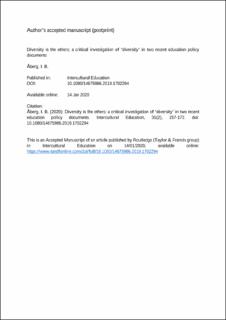Diversity is the others : a critical investigation of ‘diversity’ in two recent education policy documents
Peer reviewed, Journal article
Accepted version

Åpne
Permanent lenke
https://hdl.handle.net/11250/2671752Utgivelsesdato
2020Metadata
Vis full innførselSamlinger
Originalversjon
Åberg, I. B. (2020): Diversity is the others: a critical investigation of ‘diversity’ in two recent education policy documents. Intercultural Education, 31(2), 157-172. doi: 10.1080/14675986.2019.1702294Sammendrag
The term ‘diversity’, as a descriptive feature of a population, is increasingly common in the field of education. While seemingly a neutral and inclusive term which might cover a range of possible axes of difference, it is often used without definition or problematisation. In this article I ask what conceptions of diversity can be discerned by looking at linguistic features in two central policy documents dealing with an ongoing curriculum revision – Norwegian Official Report(NOU) 2015:8 and White Paper no. 28 2015–2016. Using a critical discourse analytical approach, I have found that ‘diversity’ points, to a large degree, to ethnic, cultural and religious minorities. Moreover, some groups are ascribed the function of creating diversity, while others experience it. These findings are discussed within a theoretical framework of equity, social justice, and democracy. In conclusion, I find that diversity, as it is used in these documents, serves to reproduce notions of ‘Norwegianness’ and ‘otherness’. The conversation on how to deal with difference is obscured, and the tension between equity and differentiation in education remains insufficiently addressed. To provide socially just education to all pupils, teachers and future teachers must be critically aware of how the policy level conceptualises difference.